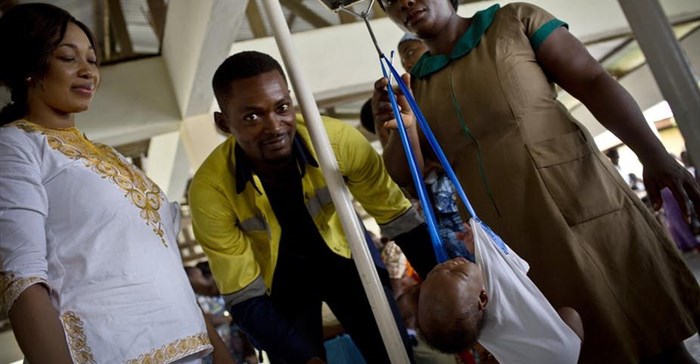
A nurse weighs a baby at a clinic in Accra, Ghana. Photo: Kate Holt/MCSP
The idea of “Health for All” was first put on the global agenda in 1978 at the International Conference on Primary Health Care at Alma Ata. It called for primary health care to be introduced as the first step to making sure that everyone has access to health care.
Since then, primary healthcare has been a feature of health systems across the world. But 40 years later, universal health coverage remains a challenge. About 400 million people do not have access to one or more essential health services. This is because they are too far, too expensive, of low quality or non-responsive to patient needs.
The big question is: how can countries strengthen their health systems to deliver accessible, affordable and equitable care when they are often under-financed and governed in complex ways?
One answer lies in governments developing policies and programmes that are informed by evidence of what works or doesn’t. This should include what we would call “traditional data”, but should also include a broader definition of evidence. This would mean including, for example, information from citizens and stakeholders as well as programme evaluations. In this way, policies can be made more relevant for the people they affect.
Globally there is an increasing appreciation for this sort of policymaking that relies of a broader definition of evidence. Countries such as South Africa, Ghana and Thailand provide good examples.
What is evidence?
Using evidence to inform the development of health care has grown out of the use of science to choose the best decisions. It is based on data being collected in a methodical way. This approach is useful but it can’t always be neatly applied to policymaking. There are several reasons for this.
The first is that there are many different types of evidence. Evidence is more than data, even though the terms are often used to mean the same thing. For example, there is statistical and administrative data, research evidence, citizen and stakeholder information as well as programme evaluations.
The challenge is that some of these are valued more than others. More often than not, statistical data is more valued in policymaking. But both researchers and policymakers must acknowledge that for policies to be sound and comprehensive, different phases of policymaking process would require different types of evidence.
Secondly, data-as-evidence is only one input into policymaking. Policymakers face a long list of pressures they must respond to, including time, resources, political obligations and unplanned events.
Researchers may push technically excellent solutions designed in research environments. But policymakers may have other priorities in mind: are the solutions being put to them practical and affordable? Policymakers also face the limitations of having to balance various constituents while straddling the constraints of the bureaucracies they work in.
Researchers must recognise that policymakers themselves are a source of evidence of what works or doesn’t. They are able to draw on their own experiences, those of their constituents, history and their contextual knowledge of the terrain.
What this boils down to is that for policies that are based on evidence to be effective, fewer ‘push/pull’ models of evidence need to be used. Instead the models where evidence is jointly fashioned should be employed.
This means that policymakers, researchers and other key actors (like health managers or communities) must come together as soon as a problem is identified. They must first understand each other’s ideas of evidence and come to a joint conclusion of what evidence would be appropriate for the solution.
In South Africa, for example, the Department of Environmental Affairs has developed a four-phase process to policymaking. In the first phase, researchers and policymakers come together to set the agenda and agree on the needed solution. Their joint decision is then reviewed before research is undertaken and interpreted together.
Joint efforts
Integrating research into government policies and programmes can result in meaningful engagement between policymakers, researchers and other actors.
Increasingly, governments and researchers are partnering in various ways to ensure that research can feed into the policymaking process as results emerge. In this way, policymakers are part of the research design as well as the actual research and its interpretation, – known as embedded research.
Ghana’s community-based Health Planning and Services is a good example. By embedding the research in the Ghana Health Service, what started as a pilot in one part of Northern Ghana became national policy in 2005 to improve primary health care.
As part of scale-up efforts, policymakers, health managers and academic researchers worked hand-in-hand to design studies and analyse routine data to improve the programme.
Today the service is a key part of Ghana’s universal health coverage strategy. And importantly the primarily rural model is being adapted for urban areas.
The journey to accessible health care
As the Ghana example shows, when there is collaboration between governments and researchers, good results are achievable. This means focusing on long-term engagement and building a comprehensive view of evidence.
When evidence is better sourced and better understood, it can be deployed more effectively. This means that there should be investment in people who are at the front line of finding solutions and implementing change.
 Policymakers, researchers, practitioners and communities need to come together to share their understanding of what evidence means, and how it can be used to strengthen health systems. This will help us chart a course to achieving universal health coverage.
Policymakers, researchers, practitioners and communities need to come together to share their understanding of what evidence means, and how it can be used to strengthen health systems. This will help us chart a course to achieving universal health coverage.
This article was originally published on The Conversation. Read the original article.

































